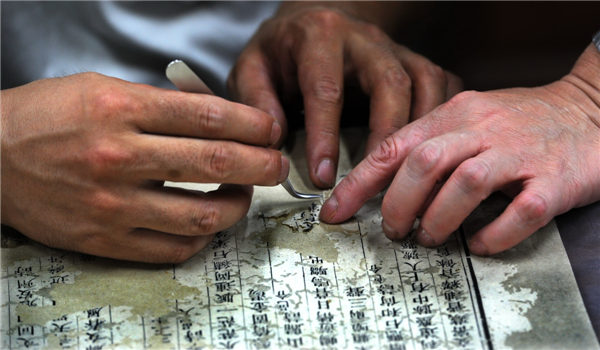New group seeks to preserve ancient books
 0 Comment(s)
0 Comment(s) Print
Print E-mail China Daily, January 28, 2015
E-mail China Daily, January 28, 2015
|
|
|
Experts try to restore an ancient book in Sichuan. |
Society needs to be mobilized to better preserve China's written history, according to a national meeting in Beijing last week.
The China Ancient Book Protection Association kicked off on Friday at the National Library of China. The industry association will function as a complement to efforts to better preserve the country's uncountable written treasures, the initiators say.
The first meeting of this nonprofit included a 62-member council from public libraries, colleges, scientific research institutions, academia and enterprises nationwide.
"The merits of traditional Chinese culture are embedded in old books," says Han Yongjin, NLC director and head of the National Center for Preservation and Conservation of Ancient Books.
"Protection of ancient books has recently been listed in the evaluation system for public libraries, and the ongoing national general survey on unmovable cultural relics also covers these books."
Han's center, under the Ministry of Culture, was established in 2007 to better lead nationwide libraries' attempts to protect such classics. However, he confesses, governments are unable to do everything that's needed.
More professional restorers with more expertise and better management are crucial, association member and Anhui Provincial Library director Yi Xiangjun says.
The problem is ubiquitous.
For example, the National Library of Congress, home to 2.6 million volumes of ancient Chinese books (those published before 1911), is the country's biggest hub of written classics.
However, there are only 20 people working to maintain and restore the fragile treasures in the institution, though the situation has improved since the NCPCAB was founded.
The country's total number of restoring professionals used to be only 100-odd, but now is over 4,000.
"The problem is the center only covers public institutions like the NLC, and does not pay equal attention to private collectors," explains the new association's counselor An Pingqiu, a literary history professor at Peking University.
"A high level of discipline is emphasized in the association to avoid the conflicts brought by different academic schools."
The new organization promotes technician training, sharing of information, and supervision of industry criteria.
An admits that one embarrassing fact is that most ancient Chinese books stored in major overseas institutions (mostly in Japan and the United States) are very well-preserved, but not many are in ideal conditions back home.
"One reason is that many ancient Chinese books were exposed to wars and social upheavals," he says, acknowledging that developed countries have better technologies and practices in book and manuscript preservation.
He expects the association's new outreach will mean more communication with overseas counterparts.
"The association will not only function as a bond connecting libraries and business sectors, but also a think tank for policymakers to refine the current legal system concerning ancient books."







Go to Forum >>0 Comment(s)